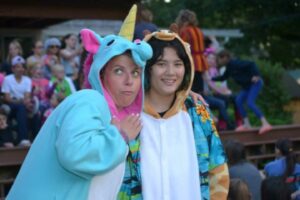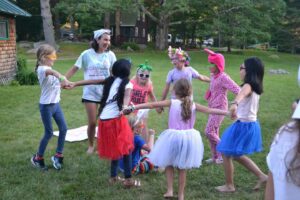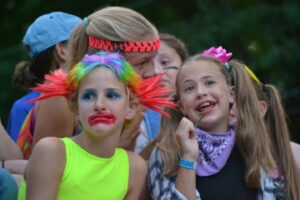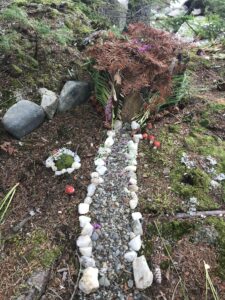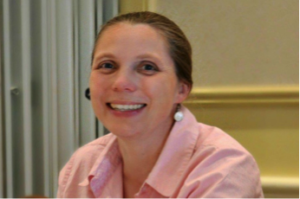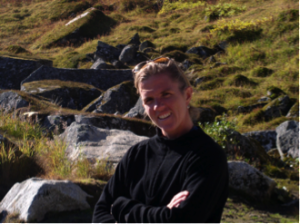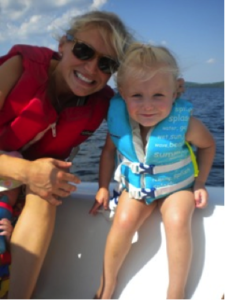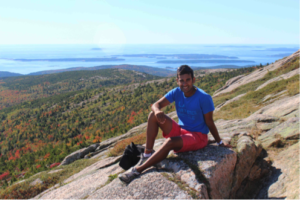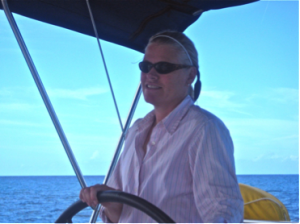Summer camp is best when it can be enjoyed by all. The ACA agrees that intentional work in diversity, equity, and inclusion at camp is vital – here’s what Runoia’s DAC is doing:
Camp is a special place in many people’s hearts – a place where friendships and confidence are built, and lifelong memories created – and is one of those things that is best enjoyed in good company and shared with others. Overnight camp, however, has not always historically included everyone – barriers to entry can include financial costs, transportation limits, and lack of information. Once campers do make it to camp, they can face other barriers that keep them from returning: a lack of that sense of belonging, a camp staff that don’t look like them or work to include them, and more. Runoia believes that intentional efforts towards justice, equity, diversity, and inclusion (JEDI) are essential to expand the positive impact of summers of camp magic to include everyone we can, and to be sure that those camp experiences are equally accessible, fun, and safe regardless of identity.
In line with this belief, Camp Runoia has embarked on a dedicated journey with its Diversity Advisory Committee (DAC), established in 2020 by Director Emerita Pam Cobb Heuberger, to champion justice, equity, diversity, and inclusion within our community. The DAC’s mission is: “Intentionally collaborating to craft relevant DEIB standards, practices, and outcomes for Camp Runoia – including hate-bias reporting, inclusive staff hiring and training practices, partnership with POC experts in the field, and educational materials and signage at camp – while supporting Runoia with tangible committee efforts and actions.”
The DAC meets monthly from October – May each year to reflect and build on the previous summer. Although originally established from three campers’ encouragement of Runoia to share a stance on Black Lives Matter, the DAC’s discussion of DEI encapsulates all dimensions of diversity: race, socioeconomic status, gender identity, health and ability status, religious beliefs, ethnicity and national origin, and more.
Now that the DAC has adjourned for the summer, we’re excited to share the action steps the DAC has taken or are currently in progress for the 2024 season:
- Review and Sharing of DEI Statement: The DAC meticulously reviewed Camp Runoia’s Diversity, Equity, and Inclusion (DEI) statement, ensuring it accurately reflects camp’s commitment to fostering an inclusive community.
- Expansion of CRAO Campership Funds: Recognizing the importance of financial accessibility, the DAC expanded CRAO campership funds to encompass more agencies, including Level Ground – an organization that specifically supports local Maine campers. The DAC also created a separate fund for everyone to contribute to – no matter if they have $5 or $500+ to give – that provides CRAO supported campers with the ‘extras’ of camp, like a Crazy Creek chair, HydroFlask water bottle, and a bracelet making kit. These are the little things that we believe can make a camper feel like they belong.
- Additions to the Camp Library: Each summer, the DAC works to expand Runoia’s camp library to review and supplement our current inventory. These additions fulfill different literary categories including diverse authors, representation in characters, and more. Before the summer begins, Runoia puts our order in for new books from Black-owned bookstores like Mahogany Books and women-owned bookstores like Tombolo.
- Translation of Morning Community Saying: Embracing the heritage of the local indigenous community, the DAC facilitated the translation of the morning community saying into Wabenaki and will be posting signage displaying the translated saying in the Lodge.
- Hate/Bias Report Forms: Each year, the DAC reviews and edits our Hate/Bias report forms and system to ensure that they are serving their intended purpose of providing campers and staff an avenue to report incidents related to identity that happen at camp. These report forms have been posted accessibly around camp, are available in anonymous formats, and are reviewed externally each year.
- Staff Training: The DAC consulted and helped form comprehensive training sessions for staff. A major change made in 2024 is the decision to weave DEI concepts and values throughout the whole of training and to use this as a lens for other existing trainings. Runoia has previously worked with amazing external resources for staff training like Strength Perspective and OAAARs.
In the world of New England camping, Runoia is committed to pushing open doors for campers and staff each summer and continuing to improve on the accessibility of an unforgettable camp experience. The DAC is excited to see all that Runoia’s campers and staff accomplish in 2024, and look forward to reflecting on the summer together in October.
With love,
the Diversity Advisory Committee of Camp Runoia
- Asha Wills, MBA Candidate MIT Sloan School of Business
- Colleen O’Malley, Assistant Director, Camp Runoia
- Pam Cobb Heuberger, MBA, Director Emerita, Camp Runoia
- Claire Williamson, Nonprofit Arts Thought Leader and Educator
- Erin Lasher, Social Worker Aurora, CO Public Schools
- Kendall Wilson, Partner at Holland & Knight LLP
- Em Friedman, Student Rep, Vassar College
- Emma Owings, MPH, Associate Project Manager at Osher Center for Integrative Medicine
- Zipporah Hommel, Associate at Bolton St-Johns, Public Policy
- Nick Teich, PhD, LCSW, Executive Coach, Fairwinds Consulting
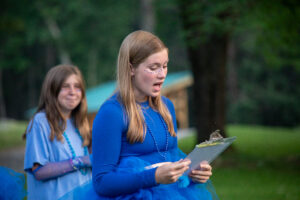
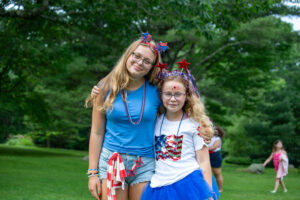

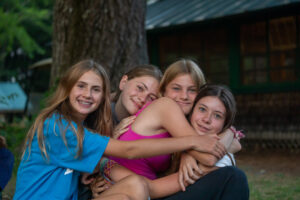
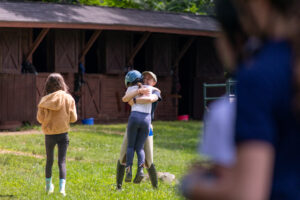

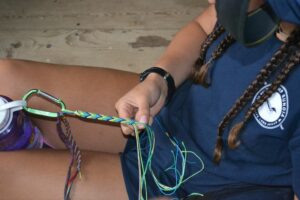
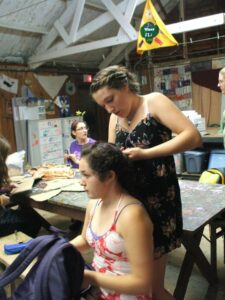 Normal, right? But it has shocked me how many adults have asked me how I know how to french braid – doesn’t everyone!? But I’ve realized that it was summers spent with “sisters” unrelated to me in braid trains by the lake that afforded me this skill – an experience not many people get to have, I’ve learned. Even as an adult at camp, two braids just can’t be beat for a long day on the waterfront!
Normal, right? But it has shocked me how many adults have asked me how I know how to french braid – doesn’t everyone!? But I’ve realized that it was summers spent with “sisters” unrelated to me in braid trains by the lake that afforded me this skill – an experience not many people get to have, I’ve learned. Even as an adult at camp, two braids just can’t be beat for a long day on the waterfront!